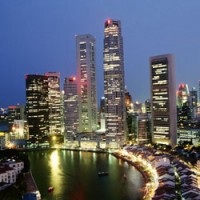The drastic steps being taken by neighbouring Singapore to cool its property market could also indirectly boost demand for real estate in our nation.
The Singapore government tightened measures for foreign buyers last weekend, aiming to cool property prices that have soared to record highs despite the economy’s slowdown, largely due to low interest rates and property speculation.
Yet Singapore’s economy grew just 1.2 per cent last year, with 2013 expected to see anaemic growth in the same range.
Under pressure from voters who complain of overcrowding as well as competition for housing and jobs, the Singaporean government is therefore trying to curb the influx of foreigners.
“We have to take this further round of measures now, to check recent market trends and avoid a more serious correction in prices further down the road,” Singapore’s Finance Minister Tharman Shanmugaratnam said last Friday.
Prices for private homes on the island state have risen by almost 60 per cent since mid-2009, and the authorities were worried about a bubble developing that could affect one of Asia’s leading financial centres.
From January 12, foreign buyers have to now pay stamp duty of 18 per cent when buying property, up from 13 per cent. Even foreigners with permanent residency in Singapore will have to pay eight per cent stamp duty, up from three per cent.
Local Singaporeans will still enjoy the earlier three per cent stamp duty for their first purchases, but will have to pay a higher rate for additional properties. The minimum cash down payment they can make for second or subsequent homes has also been raised from 10 per cent to 25 per cent of the property’s value.
These measures may well prevent a real estate bubble from developing in the city-state, but could also have a negative fallout on foreign and local demand.
Property website group PropertyGuru said the number of Singaporeans buying overseas property is likely to increase as a result.
“Singaporeans are an increasingly important demographic in many overseas markets, especially in Malaysia, Thailand, the UK and Australia,” said PropertyGuru co-founder and CEO Steve Melhuish.
“Property remains an attractive and secure investment class, and we expect overseas property purchases by buyers from Singapore will increase over the coming days, weeks and months,” he said.
Melhuish believes that there will be a decline in property prices in Singapore, especially with the large supply and the stagnant economy.
“These latest measures could well be a tipping point for a property market correction in Singapore,” he declared.
Swhengtee International Sdn Bhd founder and president Gavin Tee pointed out that this will benefit Malaysia.
“This is good news to the Malaysian property boom, as a wave of Singaporean investors into Malaysia can be expected,” he said.
According to Tee, the Malaysian property market is particularly attractive with the availability of high margin financing compared with the tightening loan-to-value (LTV) measures taken by Singapore and other countries.
He said purchasers would now head to Malaysia in a “big wave”, because of our attractive mega-project offerings and financing policies.
With Iskandar Malaysia in close proximity to Singapore, this ambitious project is expected to see increased interest from Singaporean property buyers. Covering 2,217 sq km, Iskandar is three times bigger than Singapore and two times the size of Hong Kong.
Meanwhile, HSBC Global Research said in a report that Singapore may institute more cooling measures because property demand is expected to remain robust.
“Low interest rates and an expected economic recovery this year will support demand. Further steps can, therefore, not be ruled out,” the report stated.
The Southeast Asian nation has introduced, for the first time, a seller’s stamp duty of 5 to 15 per cent on those who buy and then sell industrial properties such as warehouses and factories within three years.
The new restrictions appear to be aimed at curbing foreign interest in AAA-rated Singapore, with local banks currently charging a mere 1 per cent annual interest on housing loans.
Hong Kong had taken similar steps late last year to curb price rises.
The property markets of both Singapore and Hong Kong have been relatively open, making them a popular destination for “hot money”. With the United States loosening monetary policy, large amounts of money flow to Asia, which in turn raises local inflation.
In Malaysia, however, with the Barisan Nasional government successfully managing the economy, there is still further room for growth and enough real estate supply to absorb foreign demand in our property sector.

